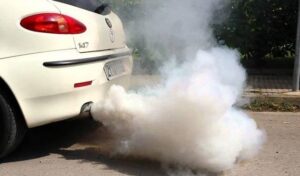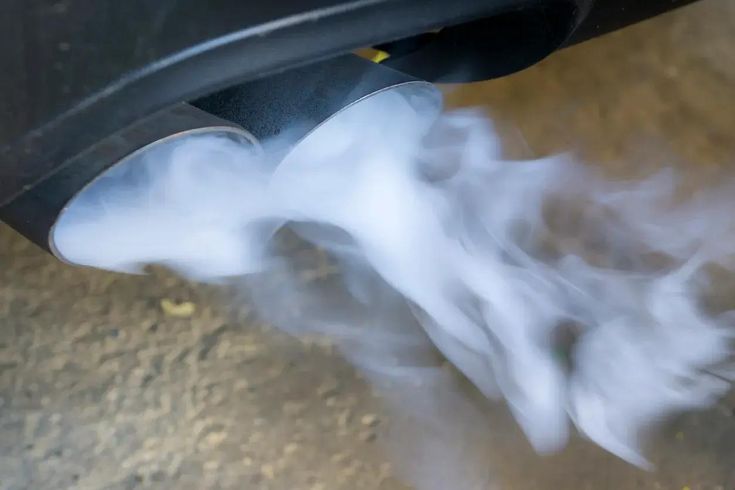White Smoke from Exhaust When Starting Car — Causes, Fixes & Prevention
Welcome to technicalreader.com. Ever started your car on a chilly morning and seen white smoke from the exhaust puffing out? That moment can feel nerve-racking — your heart drops, and you instantly think something’s wrong with the engine. But don’t panic just yet! Sometimes, that white smoke is totally normal. Other times, though, it’s your car’s way of saying “Hey, I need a bit of attention.”
In this detailed guide, we’ll break down exactly why you get white smoke from exhaust when starting car, what each type of smoke color can mean, and how you can tell the difference between harmless steam and a serious problem. We’ll also cover some common questions people ask and practical steps to fix or prevent it from happening again.
So, grab your coffee, pop open that hood if you want, and let’s talk cars. 
What Does White Smoke from Exhaust When Starting Car Actually Mean?
When you see white smoke from exhaust when starting car, the meaning depends on how thick the smoke is, how long it lasts, and what the weather or temperature is like. Let’s break it down.
1. Harmless Condensation or Steam
If it’s cold outside, the moisture in your exhaust system turns into steam when the engine starts. That light, thin, misty smoke is just condensation evaporating.
It’s completely normal — most cars do this, especially in cold or damp weather. This type of white smoke from exhaust when starting car usually disappears after a few minutes as the engine warms up.
2. Coolant Leak into the Engine (Warning Sign)
If the smoke is thick, white, and doesn’t go away — that’s not normal. It often means coolant is leaking into the combustion chamber. When the coolant burns with fuel, it produces dense white smoke with a slightly sweet smell.
This can be caused by:
-
A blown head gasket
-
A cracked engine block
-
A warped or damaged cylinder head
These issues let coolant and engine oil mix — and that’s bad news. If you also notice your coolant level dropping or the oil looking milky, stop driving and get it checked right away.
3. Unburned Fuel in Diesel Engines
If you drive a diesel, a bit of white smoke from exhaust when starting car can happen naturally, especially on cold mornings. It’s due to incomplete combustion when the engine is cold.
However, if the smoke is thick or continues after warm-up, it could mean:
-
Bad fuel injectors
-
Low compression
-
Faulty glow plugs
-
Incorrect timing
When this happens, unburned fuel exits as white or greyish smoke. A proper inspection can pinpoint which component is acting up.
4. Intake or Coolant Passage Leak
Some engines have coolant passages running near or through the intake manifold. If that gasket fails, coolant can leak into the air-fuel mixture, creating persistent white smoke from exhaust when starting car.
If the leak is small, you might only notice smoke at startup before it seals under heat.
Is White Smoke from Exhaust When Starting Car Normal? 
Sometimes yes, sometimes no. The trick is to watch how long it lasts and what it smells or looks like:
| Smoke Type | Duration | Smell / Look | Meaning |
|---|---|---|---|
| Thin, disappears fast | 1–2 minutes | Odorless steam | Normal condensation |
| Thick, sweet smell | Continuous | Dense white clouds | Coolant leak |
| White/gray, fuel smell | Persistent | Diesel engines | Unburned fuel issue |
| White only when cold | Short-lived | Slight moisture | Normal |
If the white smoke from exhaust when starting car clears quickly, relax — your vehicle is just warming up. But if it stays thick, smells strange, or your coolant keeps vanishing, that’s a clear signal to investigate.
People Also Ask
Let’s tackle a few of the most common related questions.
1. Why is my diesel smoking white when I first start it?
Diesel engines often emit light white or gray smoke when first started, especially on cold mornings. That’s because the fuel doesn’t completely burn in cold cylinders. It should disappear once the engine warms up. If it continues, you could have a fuel injector or compression issue.
2. Is it normal for diesel engines to smoke in the morning?
Yes — as long as it’s brief and light. Diesel engines rely on heat for combustion, so in cold weather, a bit of white smoke from exhaust when starting car is expected. But thick, continuous smoke means something’s off — like a glow plug or injector fault.
3. Is it normal to have white smoke from exhaust on startup?
Yes, a little bit is normal. It’s usually steam or condensation. But if it’s thick, lingers, and comes with a sweet smell or coolant loss, it’s a red flag.
4. Is it normal for a diesel to smoke on a cold start?
Light white or grey smoke for a few seconds is fine — it’s just unburned fuel from a cold engine. If it continues after warming up, that’s when you should check for fuel system or compression problems.
Main Causes of White Smoke from Exhaust When Starting Car
Let’s go deeper into each possible cause so you can identify what’s happening with your own vehicle.
1. Blown Head Gasket
This is the most common cause of persistent white smoke. When the gasket between the engine block and the cylinder head fails, coolant leaks into the combustion chamber. You might also notice:
-
Milky oil
-
Bubbling in the coolant reservoir
-
Engine overheating
-
Sweet-smelling white exhaust
2. Cracked Cylinder Head or Engine Block
Overheating or age can cause cracks, allowing coolant to seep into the engine. The symptoms are almost identical to a blown gasket — thick smoke, overheating, and coolant loss.
3. Intake Manifold Gasket Leak
If coolant runs through your intake manifold, a failed gasket can let it into the air-fuel mixture. That’s why you see white smoke from exhaust when starting car, especially if the leak is small.
4. Faulty Fuel Injectors (Diesel Engines)
Bad injectors spray too much or too little fuel, causing unburned fuel to exit as white smoke. This type of smoke often smells like diesel and can lead to rough idling.
5. Condensation Build-Up
If you only notice white smoke from exhaust when starting car in the morning and it clears fast, don’t stress. It’s just condensation in the exhaust system evaporating as steam.
How to Diagnose White Smoke from Exhaust When Starting Car
Here’s a simple step-by-step process you can follow at home before heading to the mechanic:
Step 1: Observe the Smoke
-
Thin or thick?
-
Disappears or stays?
-
What color exactly — white, grey, or bluish?
Step 2: Check Coolant and Oil
-
Coolant dropping with no visible leaks?
-
Oil looks milky or frothy?
If yes, coolant is mixing with oil — not good.
Step 3: Smell the Smoke
A sweet smell = coolant burning.
A diesel fuel odor = unburned fuel.
No smell and clears fast = steam.
Step 4: Monitor Engine Behavior
Rough idle, overheating, or warning lights mean the smoke is just a symptom of a deeper issue.
Step 5: Get a Compression or Leak-Down Test
If you’re still unsure, a compression or leak-down test will confirm whether you have internal leaks or cylinder damage.
Can You Drive with White Smoke from Exhaust When Starting Car? 
It depends on the cause.
✅ Okay to Drive:
-
The smoke is light, odorless, and disappears quickly.
That’s just condensation.
🚫 Do NOT Drive:
-
The smoke is thick and constant.
-
It smells sweet.
-
The engine is overheating or losing coolant.
Driving with coolant leaking into the engine can cause hydro lock (when liquid fills the cylinder) and destroy your engine completely.
Fixes for White Smoke from Exhaust When Starting Car
| Cause | Possible Fix |
|---|---|
| Normal condensation | None needed |
| Blown head gasket | Replace gasket, flush oil and coolant |
| Cracked head or block | Machine or replace component |
| Intake gasket leak | Replace manifold gasket |
| Faulty diesel injector | Clean or replace injectors |
| Glow plug issue (diesel) | Replace defective plugs |
If you’re not confident diagnosing it yourself, always take your vehicle to a professional. Catching it early could save you from major repair bills later.
Prevention Tips — Keep Your Car Smoke-Free
-
Don’t skip coolant changes. Old coolant can corrode seals and gaskets.
-
Maintain your engine temperature. Avoid overheating.
-
Warm up your diesel properly. Use glow plugs before starting in cold weather.
-
Inspect hoses and gaskets regularly. Early leaks are easier to fix.
-
Avoid overfilling oil or coolant. Too much fluid can create backpressure and smoke.
These small habits can prevent both harmless and serious causes of white smoke from exhaust when starting car.
Final Thoughts
So next time you see white smoke from exhaust when starting car, don’t panic — just pay attention.
-
If it’s thin and clears quickly, you’re fine.
-
If it’s thick, sweet-smelling, or persistent, you’ve got a coolant or mechanical problem.
-
For diesel engines, know the difference between normal cold smoke and unburned fuel.


